Artificial Intelligence has grown distinctly within the last few years.
ChatGPT modified the digital world and now with the creation of Generative AI, the opportunities are limitless.
AI development services has influenced the biggest industries like IT, Real estate, fintech, e-commerce, and healthcare and has also not remained untouched by its impact.
It is bringing huge changes and remodeling how medical doctors and patients experience medication. AI has become a high-quality beneficial partner in healthcare, giving medical doctors more strength and enhancing how patients get higher.
AI can achieve better patient outcomes, enhance care delivery, and drive operational gains for the healthcare industry – McKinsey)
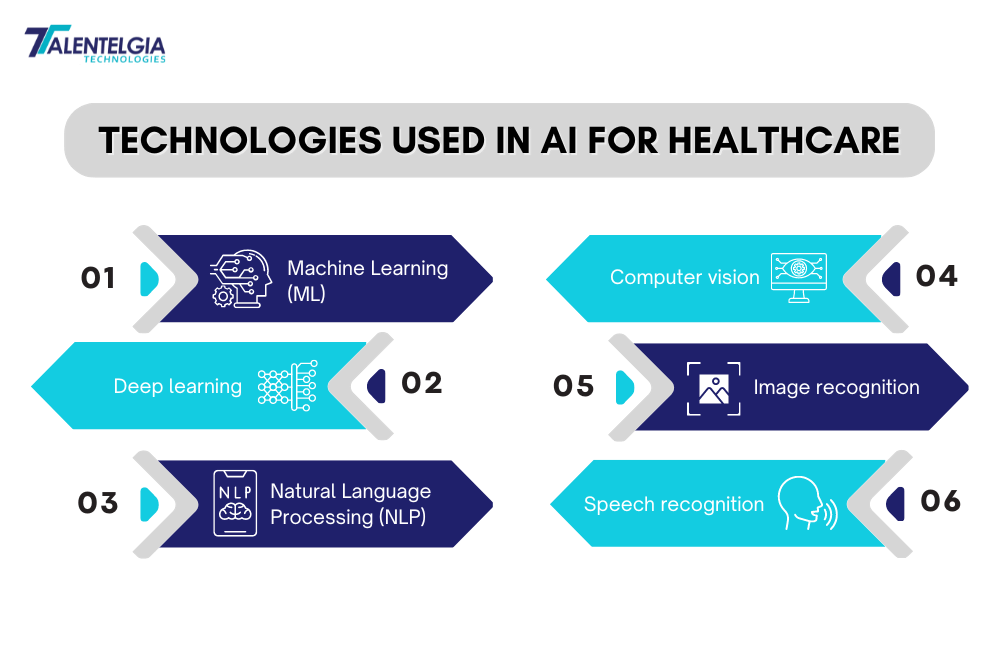
Practical AI Use Cases in Healthcare
AI boosts the accuracy of doctors in figuring out what’s going on with a patient.
It uses super smart algorithms to look at tons of data about a person, like their medical history, scans, and even their genes. This helps AI find patterns that might be hard for human doctors to spot. Because of this, doctors can discover and understand health issues sooner and with more accuracy.
Let’s look at some more of its benefits:
Patient Care
AI uses machine learning algorithms to revolutionize treatment decision-making. By analyzing data from numerous clinical trials, research publications, and historical treatment outcomes, AI becomes a knowledge-driven advisor.
This analytical capability empowers AI to recommend evidence-based treatment strategies for specific health conditions. AI doesn’t stop there; it also reshapes how doctors determine treatment plans with advanced equipment, and Android & IOS mobile applications.
Early Diagnosis
AI has become a lifesaver for patients suffering from blood diseases. It analyzes complex data for conditions like leukemia, including genetics and blood cell details. It’s like having an expert doctor with a keen eye, flagging potential signs of blood diseases early on. With time, AI gets even better at recognizing these signs.
Virtual Assistants and Chatbots
Imagine having a friendly assistant always ready to help with health questions. AI-powered chatbots do just that. They give personalized advice, offer medication info, and help schedule appointments. It’s like having a 24/7 receptionist, making life easier for both patients and healthcare professionals.
Remote Health Patient Care
AI keeps an eye on patients from afar, checking their heart rate and blood pressure. It’s like having a virtual nurse that alerts doctors to early signs of heart disease. For chronic conditions like diabetes, AI analyzes glucose levels, creating personalized plans. Wearable devices, powered by AI, monitor vital signs, allowing doctors to act fast and prevent problems.
Research & Development
Over 69% of healthcare companies are piloting or adopting AI solutions for administrative assistance to preliminary diagnosis.
Let’s dive into the world of Research & Development, where AI can make amazing things happen!
Medical Research
AI functions like an expert scientist in the world of medical research. It analyzes huge amounts of data, helping researchers find patterns, correlations, and breakthroughs. This data-driven approach speeds up discoveries and improves how diseases are treated. For example, AI can analyze patient records, trial results, and genetic data to figure out which cancer treatment works best for specific patients.
Drug Discovery
Developing new drugs takes time and money, but AI turns into an expert for drug experts. It helps analyze existing medications, reformulating them to fight specific diseases. This innovation speeds up drug development, and AI even identifies potential drug targets by diving into vast genomic data.
Imagine we have an excellent team looking for new medicines. They use smart technology and past information to find fresh, powerful drugs.
Gene Detectives and Editing
AI gives scientists an in-depth understanding of genes and their parts. They even predict what will happen if they make changes! It’s like having experts who can predict the future of genes.
Device and drug comparative effectiveness
Imagine working with experts to compare different tools and medicines to see which works best. Technologies like big data and deep learning make this easier. They help professionals choose the right things for experiments and missions!
Genetic Studies
AI studies a patient’s genetic info, medical history, and lifestyle to predict disease risks and suggest unique treatments. It’s like a health wizard giving doctors the power to provide personalized care. For instance, AI helps choose the best chemotherapy drugs based on genetic details.
Future Of AI in Healthcare
AI is revolutionizing healthcare, from diagnosis to treatment, enhancing efficiency and accuracy. It promises a future of personalized medicine and improved patient outcomes.
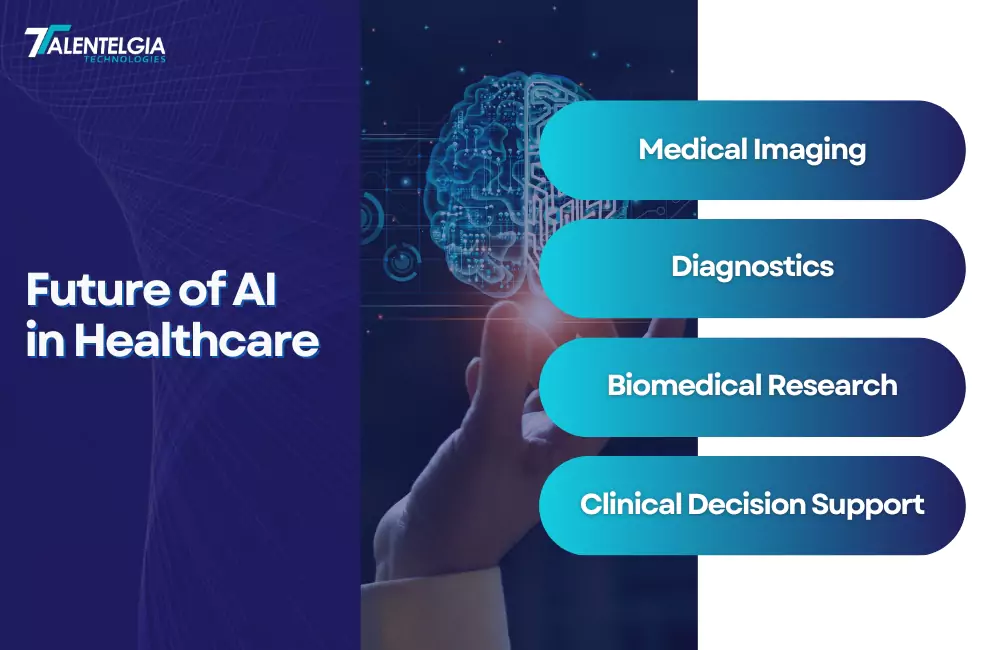
Diagnostics
AI is not just an option but a necessity. Let’s explore how AI transforms diagnostic in healthcare with personalized treatment.
Medical Imaging
Venturing into the realm of Medical Imaging, let’s unveil the incredible influence of artificial intelligence (AI) on healthcare. AI’s magical ability to understand pictures like CT scans, MRIs, and X-rays gives doctors special insights into how patients are doing. This super tech boosts the speed and accuracy of figuring out what’s going on, making patients feel better faster.
Early Detection
AI is likees makes diagnostics easier with CT scans, MRIs, and X-rays. This helps doctors understand what’s going on inside our bodies. AI’s superpower is analyzing these images super accurately and fast. This means doctors can figure out what’s wrong with us quickly, making us feel better sooner.
Lung Diseases
For those who have a history of lung issues, AI can scan CT images to find tiny lung nodules. This move lowers the chance of missing any dangerous nodules, especially in those at risk of lung cancer. AI can also diagnose osteoporosis in X-rays, a bone-thinning problem that makes bones break easily.
Brain Scans
It examines MRI scans, helping doctors spot brain tumors and plan surgeries. It’s also an expert in catching early signs of Alzheimer’s and dementia by studying brain scans. Additionally, Additionally, retinal images, detect early diabetic retinopathy that could lead to blindness in diabetic patients.
Data Management
AI can sift clinical trials, research papers, and historical treatment data and recommend effective and proven treatments for specific health conditions, simplifying doctors’ decision-making process.
In the world of taking care of health, there are some important jobs to do. Let’s talk about a few of them!
Electronic Health Records (EHRs)
Electronic Health Records (EHRs) are crucial, and AI helps manage them like a magician. By analyzing tons of medical data, AI identifies patterns to prevent diseases and improve treatments. It’s like having a librarian organizing data to predict diabetes or heart disease risks.
Fraud Detection
AI scans through piles of medical and billing data to catch any sneaky moves. It learns normal behavior and quickly spots anything fishy, like overbilling or unnecessary procedures. AI ensures healthcare resources go where they’re needed, saving money and taking care of genuine patients.
Sometimes, people might pretend they need health help when they don’t. AI-powered tools help hospital managers find out who’s being tricky with health claims.
Data-Driven Decision-Making
When it comes to clinical decisions, AI is like an assistant for doctors. It digs into patient data, from records to lab results and medical images, helping doctors identify patterns and potential outcomes. This guidance ensures patients get the best care based on their health needs.
Risk Prediction
AI models become perfect tools for predicting big events, like pandemics. By using vast datasets and advanced algorithms, AI can simulate how diseases might spread. This simulation helps policymakers and healthcare groups plan and respond to keep people safe.
Managing Medical Records
AI doesn’t just stop at medical records; it becomes an efficient organizer. By using advanced algorithms, AI automates data entry and document management. It’s like having a librarian who can find any information quickly. This saves time, improves patient care, and eases the workload for medical staff.
Branding and marketing
To know what other health places are up to is a lot of work! Advanced software and web applications function as worldwide detectives for health and medicine info. They gather lots of details to help hospitals know what others are doing.
Pricing Tag
Deciding how much health stuff should cost is like finding the perfect price tag. It’s important to know and understand what others are doing or what’s happening in the market. Making sure treatments and services are priced just right is an important step.
Automation
Sometimes, hospitals have lots of paperwork. Imagine if there were experts who could make computers do some of the work! Intelligent automation and RPA are like them. They help hospitals do routine tasks without much hassle.
Customer Service Chatbots
Talking to someone about your health questions should be easy, right? Customer service chatbots are like friendly helpers. With ChatGpt integration in the softwares can help users to chat with patients about things like paying bills, setting up appointments, or getting more medicine.
More Use Cases
In the world of healthcare, generative artificial intelligence (AI) is like a versatile assistant, taking on important roles that benefit both doctors and patients. Let’s explore these roles:
Quick Notes and Reports
Generative AI can write notes, reports, and patient histories for doctors, making their paperwork faster and more accurate. It’s like an assistant, helping with all the important paperwork in a blink.
Personalized Plans
Analyzing medical records, generative AI creates personalized treatment plans for patients based on their unique health conditions. It’s like a doctor, tailoring treatments to fit each patient perfectly.
Talk the Talk
With models like GPT-3, generative AI talks in natural language, helping chatbots and virtual assistants in healthcare. They schedule appointments, answer questions, and even offer reminders. It’s like having a friend who talks and helps with everything.
Documentation
Generative AI can read and summarize long medical writings, making it easier for doctors to stay updated. It’s like a reader, quickly going through lots of information and giving the highlights.
Virtual Simulations
For training doctors and nurses, generative AI creates realistic medical simulations. It’s like having a trainer, making sure healthcare professionals are ready for anything without risking real patients.
Predicting Future Health
Generative AI helps predict diseases based on a patient’s history and lifestyle. It warns about potential health issues so doctors can act early.
Virtual Helpers
Powering healthcare chatbots and virtual assistants, generative AI acts as a helper, providing information, setting appointments, and even assessing symptoms remotely.
Ethical Guardian
Lastly, generative AI plays a role in creating ethical guidelines for healthcare AI. It ensures responsible and fair decisions are made. It’s like a careful guardian, watching over and guiding AI to do the right thing.
Benefits of AI in Healthcare
AI speeds up the processes in Healthcare, helping scientists make discoveries faster. It’s like a smart helper for doctors, aiding them in making the best decisions for each patient. And, also predicts risks during big health events, helping authorities take the right steps to keep everyone safe.
AI in healthcare is like having a team of experts, making everything faster, smarter, and personalized for everyone’s well-being. Let’s look at some more of its benefits
- Artificial Intelligence (AI) brings many benefits that make our health better! One of the big advantages is that it speeds up diagnosis – AI helps doctors and nurses quickly figure out what’s wrong with us.
- It makes the process easier with CT scans and X-rays, and finding diseases early on. This means we get the right treatment faster and have a better chance of feeling better.
- AI acts to figure out the best treatment based on their history and genes. It’s like having a personalized plan for each patient, making them feel better.
- It is also great when it comes to managing health records. It finds patterns in lots of data, helping doctors prevent diseases and keep people healthy. It even fights against fraud, making sure resources go to real patient care.
- AI-powered chatbots are like that, giving advice and making healthcare more accessible. They also help doctors by handling some tasks.
Conclusion
AI in healthcare is a game-changer. It makes diagnoses more accurate, treatments more personalized, and frees up time for better patient care. From streamlined administrative tasks to bringing healthcare to remote areas, AI is transforming how we approach health. Challenges like privacy and ethics need attention, but the potential benefits are clear – a future where technology and healthcare work hand in hand for better outcomes and improved efficiency.


 Healthcare App Development Services
Healthcare App Development Services
 Real Estate Web Development Services
Real Estate Web Development Services
 E-Commerce App Development Services
E-Commerce App Development Services E-Commerce Web Development Services
E-Commerce Web Development Services Blockchain E-commerce Development Company
Blockchain E-commerce Development Company
 Fintech App Development Services
Fintech App Development Services Fintech Web Development
Fintech Web Development Blockchain Fintech Development Company
Blockchain Fintech Development Company
 E-Learning App Development Services
E-Learning App Development Services
 Restaurant App Development Company
Restaurant App Development Company
 Mobile Game Development Company
Mobile Game Development Company
 Travel App Development Company
Travel App Development Company
 Automotive Web Design
Automotive Web Design
 AI Traffic Management System
AI Traffic Management System
 AI Inventory Management Software
AI Inventory Management Software
 AI Software Development
AI Software Development  AI Development Company
AI Development Company  AI App Development Services
AI App Development Services  ChatGPT integration services
ChatGPT integration services  AI Integration Services
AI Integration Services  Generative AI Development Services
Generative AI Development Services  Natural Language Processing Company
Natural Language Processing Company Machine Learning Development
Machine Learning Development  Machine learning consulting services
Machine learning consulting services  Blockchain Development
Blockchain Development  Blockchain Software Development
Blockchain Software Development  Smart Contract Development Company
Smart Contract Development Company  NFT Marketplace Development Services
NFT Marketplace Development Services  Asset Tokenization Company
Asset Tokenization Company DeFi Wallet Development Company
DeFi Wallet Development Company Mobile App Development
Mobile App Development  IOS App Development
IOS App Development  Android App Development
Android App Development  Cross-Platform App Development
Cross-Platform App Development  Augmented Reality (AR) App Development
Augmented Reality (AR) App Development  Virtual Reality (VR) App Development
Virtual Reality (VR) App Development  Web App Development
Web App Development  SaaS App Development
SaaS App Development Flutter
Flutter  React Native
React Native  Swift (IOS)
Swift (IOS)  Kotlin (Android)
Kotlin (Android)  Mean Stack Development
Mean Stack Development  AngularJS Development
AngularJS Development  MongoDB Development
MongoDB Development  Nodejs Development
Nodejs Development  Database Development
Database Development Ruby on Rails Development
Ruby on Rails Development Expressjs Development
Expressjs Development  Full Stack Development
Full Stack Development  Web Development Services
Web Development Services  Laravel Development
Laravel Development  LAMP Development
LAMP Development  Custom PHP Development
Custom PHP Development  .Net Development
.Net Development  User Experience Design Services
User Experience Design Services  User Interface Design Services
User Interface Design Services  Automated Testing
Automated Testing  Manual Testing
Manual Testing  Digital Marketing Services
Digital Marketing Services 
 Ride-Sharing And Taxi Services
Ride-Sharing And Taxi Services Food Delivery Services
Food Delivery Services Grocery Delivery Services
Grocery Delivery Services Transportation And Logistics
Transportation And Logistics Car Wash App
Car Wash App Home Services App
Home Services App ERP Development Services
ERP Development Services CMS Development Services
CMS Development Services LMS Development
LMS Development CRM Development
CRM Development DevOps Development Services
DevOps Development Services AI Business Solutions
AI Business Solutions AI Cloud Solutions
AI Cloud Solutions AI Chatbot Development
AI Chatbot Development API Development
API Development Blockchain Product Development
Blockchain Product Development Cryptocurrency Wallet Development
Cryptocurrency Wallet Development About Talentelgia
About Talentelgia  Our Team
Our Team  Our Culture
Our Culture 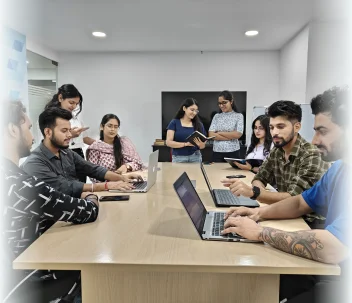
 Healthcare App Development Services
Healthcare App Development Services Real Estate Web Development Services
Real Estate Web Development Services E-Commerce App Development Services
E-Commerce App Development Services E-Commerce Web Development Services
E-Commerce Web Development Services Blockchain E-commerce
Development Company
Blockchain E-commerce
Development Company Fintech App Development Services
Fintech App Development Services Finance Web Development
Finance Web Development Blockchain Fintech
Development Company
Blockchain Fintech
Development Company E-Learning App Development Services
E-Learning App Development Services Restaurant App Development Company
Restaurant App Development Company Mobile Game Development Company
Mobile Game Development Company Travel App Development Company
Travel App Development Company Automotive Web Design
Automotive Web Design AI Traffic Management System
AI Traffic Management System AI Inventory Management Software
AI Inventory Management Software AI Software Development
AI Software Development AI Development Company
AI Development Company ChatGPT integration services
ChatGPT integration services AI Integration Services
AI Integration Services Machine Learning Development
Machine Learning Development Machine learning consulting services
Machine learning consulting services Blockchain Development
Blockchain Development Blockchain Software Development
Blockchain Software Development Smart contract development company
Smart contract development company NFT marketplace development services
NFT marketplace development services IOS App Development
IOS App Development Android App Development
Android App Development Cross-Platform App Development
Cross-Platform App Development Augmented Reality (AR) App
Development
Augmented Reality (AR) App
Development Virtual Reality (VR) App Development
Virtual Reality (VR) App Development Web App Development
Web App Development Flutter
Flutter React
Native
React
Native Swift
(IOS)
Swift
(IOS) Kotlin (Android)
Kotlin (Android) MEAN Stack Development
MEAN Stack Development AngularJS Development
AngularJS Development MongoDB Development
MongoDB Development Nodejs Development
Nodejs Development Database development services
Database development services Ruby on Rails Development services
Ruby on Rails Development services Expressjs Development
Expressjs Development Full Stack Development
Full Stack Development Web Development Services
Web Development Services Laravel Development
Laravel Development LAMP
Development
LAMP
Development Custom PHP Development
Custom PHP Development User Experience Design Services
User Experience Design Services User Interface Design Services
User Interface Design Services Automated Testing
Automated Testing Manual
Testing
Manual
Testing About Talentelgia
About Talentelgia Our Team
Our Team Our Culture
Our Culture
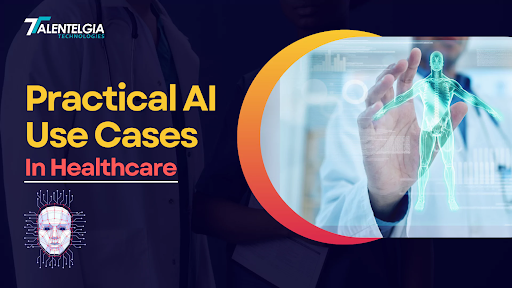

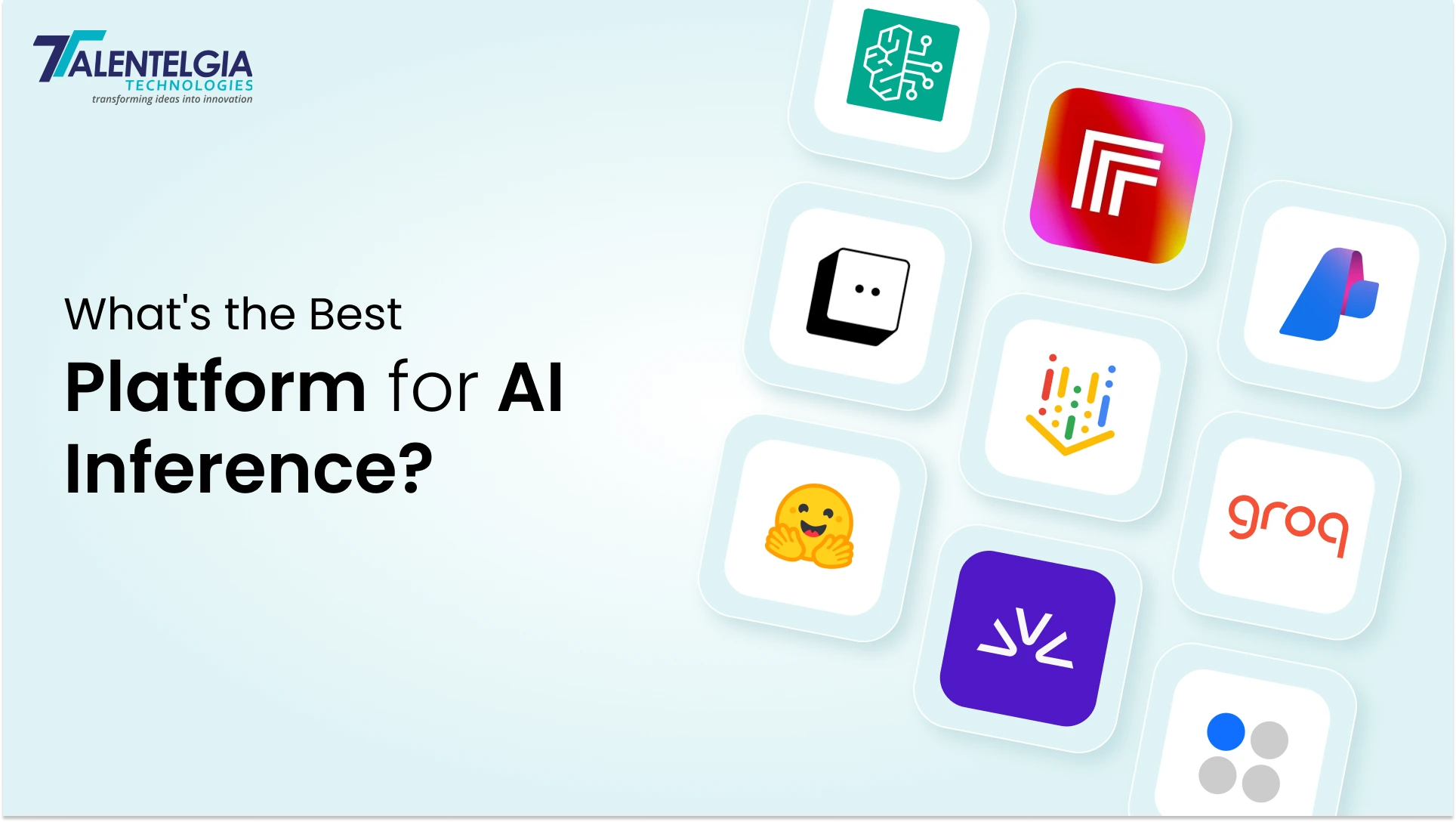

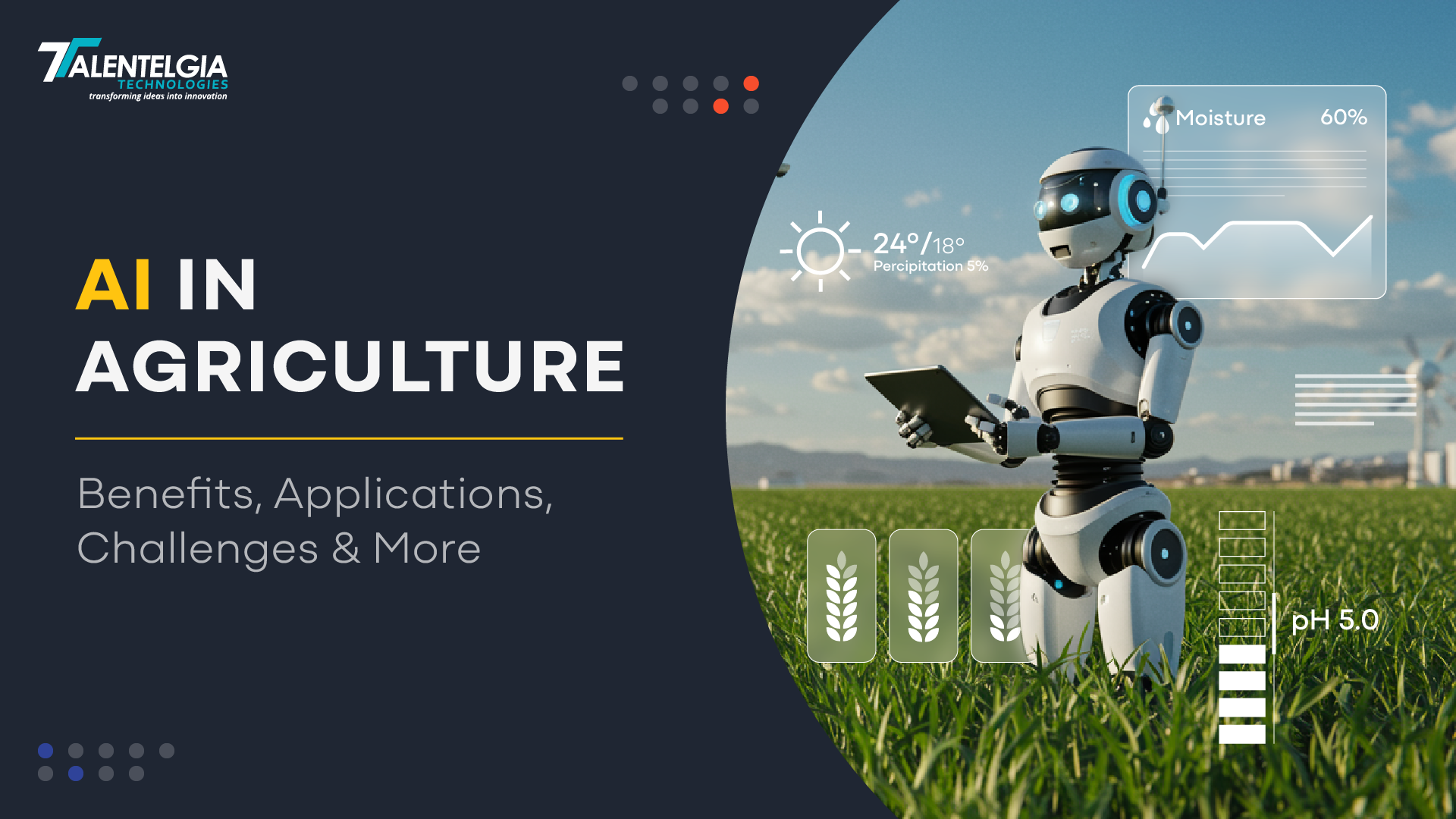

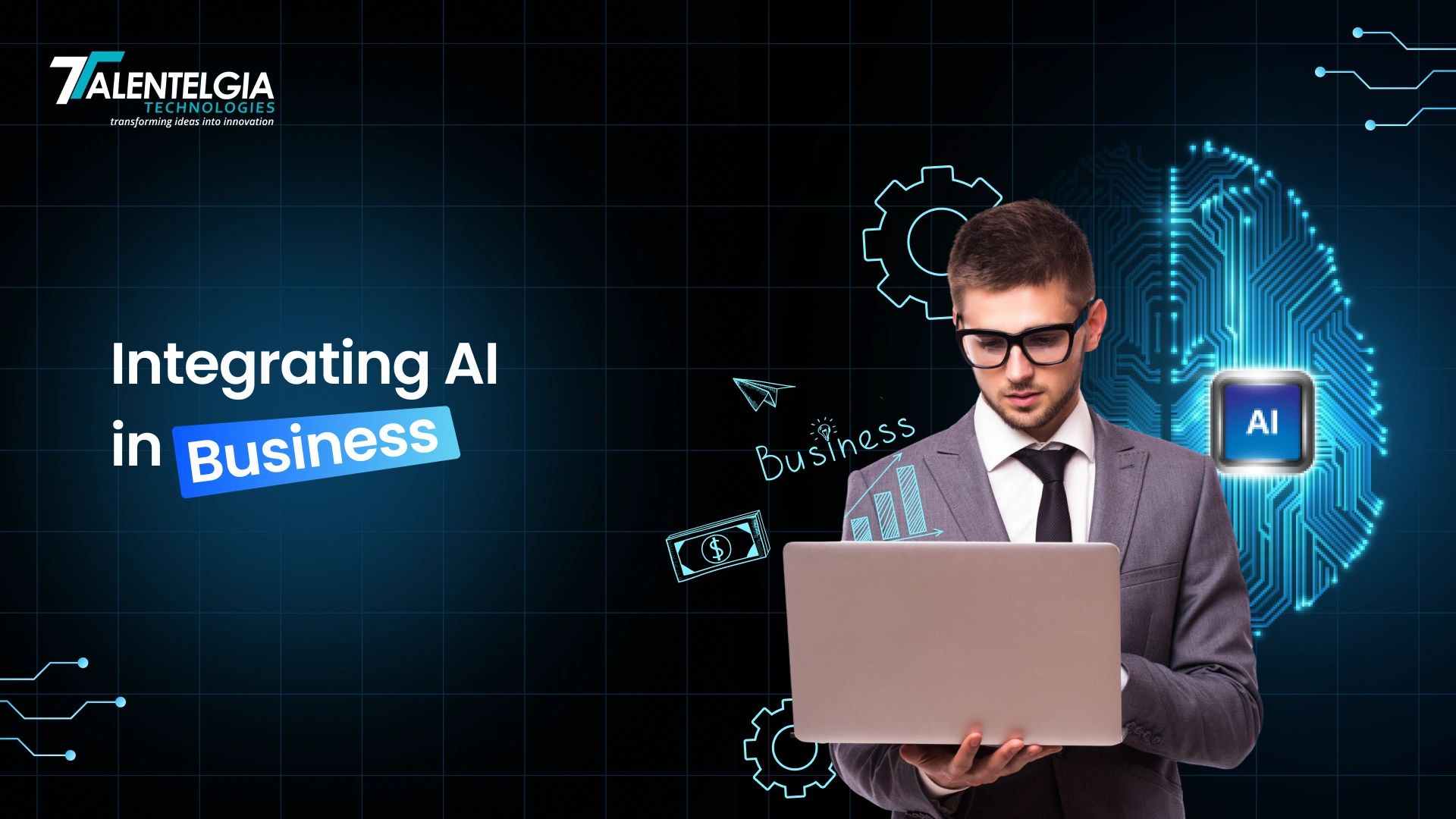











 Write us on:
Write us on:  Business queries:
Business queries:  HR:
HR: 




